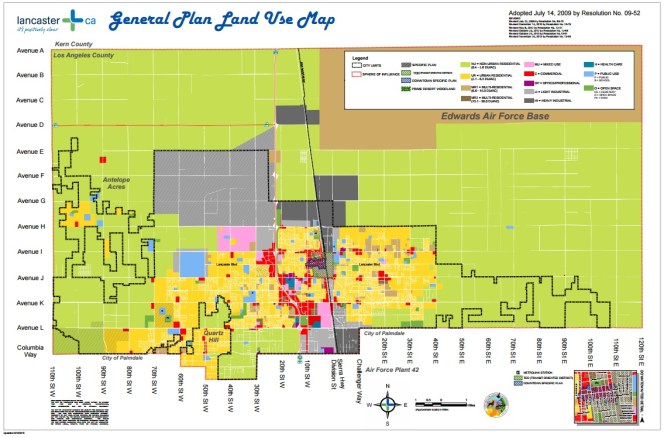Last night, the city of Lancaster gave final approval to an ordinance deleting parking requirements for commercial zones. The staff report [PDF] cites eliminating parking requirements as one step "to reverse low-density, sprawling development patterns, and the resulting fiscal liabilities." Further, "by removing this regulatory barrier, developers would have the ability to maximize land use potential and value generation, with resulting long-term benefits to the City."
Parking expert Don Shoup has long criticized municipal off-street parking minimum requirements as a "pseudoscience." In many cases, one-size-fits-all parking standards are set based on very limited suburban examples, then applied throughout all kinds of neighborhoods.
Excessive parking drives up the costs of doing business. In the words of the Lancaster staff report, "excessive, little-used parking spaces carry a definite cost, both in terms of the land needed to build them and the costs to maintain them." These costs are paid by all customers, whether one drives or not. Right-sizing parking makes economic sense.
Lancaster's Planning Director Brian Ludicke stated that the new law makes off-street parking "a business decision." The "parking decision is in the hands of people who will benefit, or who will suffer" from that decision. Ludicke cited the example of the Trader Joe's in nearby Palmdale. Trader Joe's has reputation for somewhat difficult parking, but this reduces their overhead, contributing to lower prices. Businesses like Trader Joe's will locate in areas with appropriate parking for their business model, and shoppers may adjust the ways and the times they patronize businesses, based on parking and other factors.
Ludicke anticipates the ordinance will create more options for older, smaller commercial buildings, especially those that are not part of a larger shopping center. Parking requirements inhibit re-use of these older buildings, including those along the city's main drag, Lancaster Boulevard. Again, from the city staff report, "Providing flexibility on off-street parking opens more options for development and utilization of under-used parking, particularly along the street frontages of commercial centers. In the long-term, more efficient utilization of land is also good for the City, providing a greater amount of tax base and employment opportunities."
One additional benefit Ludicke cited was saving city planning staff time spent on calculating, determining, and verifying compliance.
The ordinance has a safeguard clause to prevent extreme abuse. Developers are required to "determine the number of parking spaces sufficient for the proposed use" and "provide justification acceptable to the Director of Development Services and/or the Planning Commission to support the determination." According to Ludicke, the city is likely to accept "any reasonable number."
Parking minimums remain in place for residential zones. Disability parking requirements remain in effect. The ordinance takes effect in 30 days.






